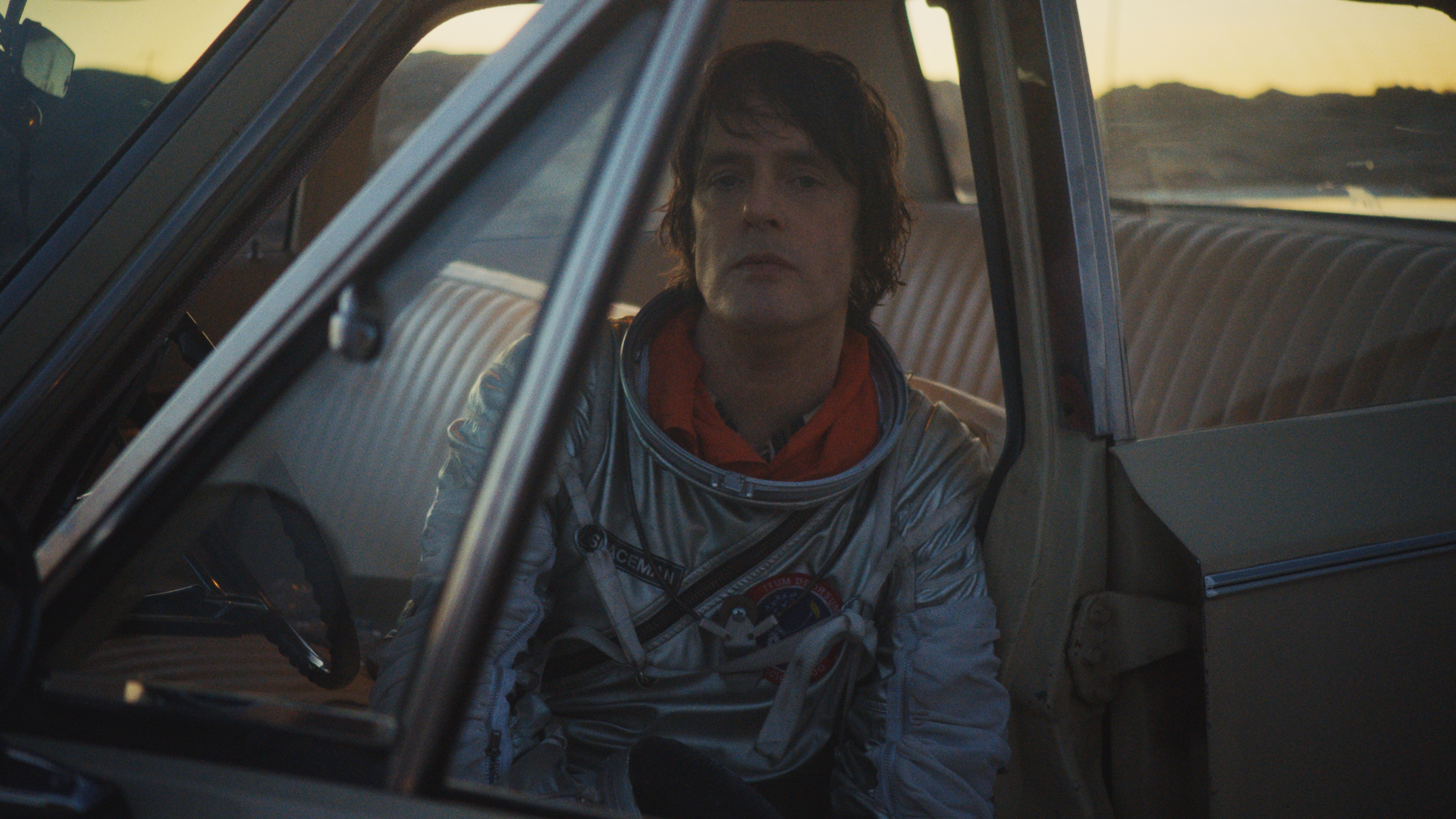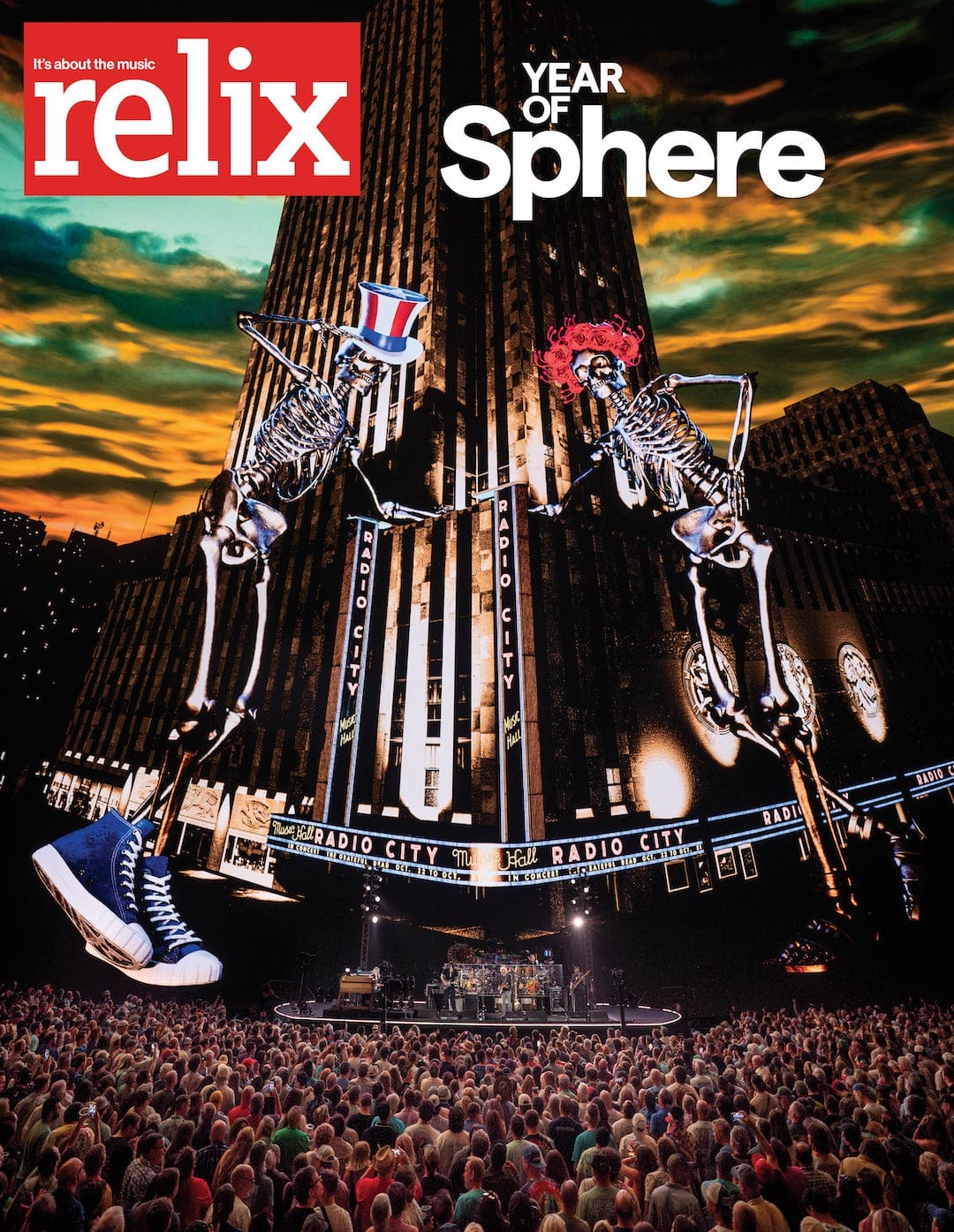Spiritualized: In Space, Nobody Can Hear You Scream

photo by Juliette Larthe
In 2005, Jason Pierce narrowly escaped death. And now, Spiritualized’s sole proprietor is determined to create his most ambitious show yet—even if it breaks the bank.
It’s been almost 24 hours since Jason Pierce, the sole proprietor of space-rock institution Spiritualized, walked offstage at the Kings Theatre in Brooklyn, N.Y. At the moment, he’s sitting in a Mexican-inspired coffee shop in the Crown Heights section of the borough, blocks away from an Airbnb he’s rented for a few days while in town from London—the adrenaline he got from playing an exhilarating show is clearly still flowing through his veins. There’s a twinkle in his eye and a perma-grin on his face that you just never see in his promotional photos. He’s happy. He’s in a good mood. He’s taking repeated pulls off an inconspicuous little vape pen.
“I’ve probably lost $40,000 on these shows,” he admits, hunching over the day’s New York Times. Pierce is tall, wiry thin, and though his body is a large presence, he hardly seems to take up any space in the booth we’re sitting in.
What he means is that he’s losing money to play just two stateside shows to support Spiritualized’s eighth album, And Nothing Hurt: the one in Brooklyn and another a few days later in Los Angeles. Both shows are massive in scale. A full choir and orchestra were hired to give the new material a huge, grandiose sound—a sound that’s been part of the band’s fabric since 1997’s seminal album Ladies and Gentlemen We Are Floating in Space. He met the musicians that would join him on stage in Brooklyn just a day earlier; they only ran through the show a few times before doing the whole thing in front of an audience. Los Angeles would be the same way: Hi I’m Jason, great to meet you. Let’s play some massive, mind-blowing music together in front of people. Cool?
Moments like these are what have sustained Pierce over the last several decades. He’s a dedicated servant to the art of the live performance, but not a perfectionist. He welcomes a hiccup here and there because it’s part of the challenge, part of the process, part of the way you figure things out in real-time—because in today’s data-obsessed, algorithm-predicted world, a live show with an orchestra and choir you’re meeting for the first time hours before going onstage is the exact approach to life Pierce needs. Perhaps it’s what we all need.
“It’s taken a lot of convincing people that this is worth it,” he says. “That’s the hurdle. We played shows without the heavy guns—and the new material, it’s beautiful. It doesn’t suffer. There’s more room for the guitars. It becomes a more visceral and rock-and-roll thing. And in a way, it’s more charming. The voice is bigger. The dynamic is great anyway. The show starts with your voice and a guitar, it’s still there and it’s not propped up by the orchestra. I couldn’t do it on the record, so I didn’t want to not do it at all.”
Pierce’s big moment here in Brooklyn wasn’t always a guarantee. And it wasn’t just the cost that was a burden, though that was definitely a big part of it. As he takes another discreet pull from his vape, he says, “I drove myself mad” to get to this point. It’s a sentiment that anyone obsessed with creativity can relate to, but perhaps it should come easier for him at this point. So how mad did he get? Mad enough that he felt like giving up.
Pierce started Spiritualized as a four-piece in 1990, the follow-up group to his underground cult favorite Spaceman 3, a drone-rock band he cut his teeth with through the ‘80s when he and his bandmate Peter “Sonic Boom” Kember decided to go their separate ways. Spiritualized’s first two albums, 1992’s Lazer Guided Melodies and 1995’s Pure Phase, quickly identified what would become his defining sound: grand musical gestures, wrapped around soul, gospel, blues and psychedelia. Those first two albums are the most experimental in Pierce’s catalog. The band was often lumped into the “shoegaze” genre, but they were always much more than that—lush arrangements mixed with drugged-out vocals and, at times, a wash of reverb, professing deep emotions around every turn. In that way, Spiritualized stood apart from the other bands of the Brit-pop wave of the 1990s: Oasis, Blur, Pulp and The Verve were all topping the charts and headlining festivals with a sound that was driven mainly by the guitar, bittersweet symphonies that felt tailor-made for MTV. Early on, it was evident that Spiritualized never seemed content to rely on just one thing.
It was 1997’s Ladies and Gentlemen We Are Floating in Space that was seen as a creative leap forward, an instant classic that has followed Pierce since. Although he’s said in interviews that he doesn’t see the album as a standout like others seem to, he’s performed it from start to finish sporadically over the last eight years to euphoric effect. If he can, then he’ll bring an orchestra and a choir to these shows too, making for a church-like atmosphere—if church lent itself to a psychedelic experience. Compared to Lazer and Pure Phase, Ladies and Gentlemen was rock-and-roll on a much larger scale, which set the template for Pierce for years to come.
The early days of Spiritualized as a band dissolved around that time, when it essentially became a project for Pierce to play under the Spiritualized name—he’d record what he could and enlist an impressive cast of musicians along the way to fill out the parts he couldn’t. His recorded output, though, has slowed down in the last 15 years. And Nothing Hurt is the first Spiritualized album in six years, the longest time he’s taken between records.
To get the nine songs to a place that he was happy with, Pierce says he spent a good portion of two years constructing the album from recorded parts in his bedroom on the computer. His days would be long and lonely, a painstaking process that he says was “maddening.”
“I’d be brought bread and milk, so I could eat,” he recalls.
Pierce also talks a lot about money when discussing And Nothing Hurt—that he chose this way of working as a necessity. He couldn’t afford to have long studio sessions like he may have wanted but, at the same time, didn’t want to give up either, even though he seemed to threaten it: In 2016, he told the U.K.’s Independent that he thought this one could be his last hurrah.
“I just couldn’t afford to do these big sessions,” he says. “So when I had some cash, I would go to the studio and say ‘bring some marimba.’ All the timpani on the album went down in a single day. And I pieced it together, almost the opposite of how I would want to make a record. It was so against everything—taking these iconic pieces of what you call my band and blocking them in. It’s like painting by numbers, but not even done well. It is like painting over the lines, and scrappy. I just looked at it as economics—financial reasons made me do this. I don’t think there’s a single point where a musician is playing in the same room as another, which seems kind of dumb. Music is all about listening. But this is how I could afford to do it.”
Although he worked under less than ideal circumstances, Pierce’s end result is a magnificent triumph, 48 minutes of highs and lows, an inner monologue that he says winds through love, loss and twisted romance. The soulful opener, “A Perfect Miracle,” finds Pierce essentially telling someone they’re the bees knees, but wait, not really, as he sings, “Darling you know, I’m sorry/ I won’t get to see you today/ My mind is a mess and I needed you less/ Give me a call in a little while.” Moments later, he’s the epitome of self-deprecation on “I’m Your Man,” where he confesses, “If you want wasted, faded, uneducated/ Doing the best that he can/ I’m your man.” The whole album teeters like this—big, sweeping moments that sound like a massive production, mixed with intimate, direct feelings that anyone would have immense difficulty expressing. As the album winds down, on “The Prize,” he admits, “And maybe I should get down on my knees and say/ That I don’t know anything or anymore to anyone else today/ And I don’t know if love’s the way.”
At some point during the making of And Nothing Hurt, Pierce turned 50. He doesn’t remember what he did to celebrate that milestone number and shrugs it off with a devilish grin as just another day—as if he’s proud that he doesn’t take stock in pedestrian things like birthdays. It’s that head-down mentality that has sustained his career into his 50s, which almost didn’t happen in the first place.
In 2005, Pierce nearly died. He was laid up from complications of double pneumonia that actually stopped his heart and, a few years later, his body almost gave up due to liver disease.
“I never really thought I was in any danger,” he admits. “I was just lying around; I didn’t think about it. I remember the little machines and that it was a shared room. There were seven or eight others in that room. You always assume that intensive care is a solitary experience because that’s how it’s always shown in the movies. You lying in the bed with wires and stuff. I remember thinking ‘somebody’s gotta get out’ or no one is going to want to come. They’re going to lose their customers.”
In a way, And Nothing Hurt is a declaration of where Pierce is as an artist today: Nothing is going to stop him from recording, and it’ll get done one way or another—money or no money, disease or health. Because for Pierce, one of the ultimate goals is to take his new material on the road. He loves the road. A song on the new album is called “Here It Comes (The Road) Let’s Go.” His eyes light up when he talks about finding new music on the road in America during past tours or the big green interstate signs that line the country’s highways.
If there’s one thing he’d like to do besides make records, then it’s compose music for film. He did it once, for Harmony Korine’s 2007 indie flick Mister Lonely. “I never get asked,” he says. “[But] I loved it because you don’t have to please yourself. You kinda have to please yourself, but you’re working on something that has to please something else. I can make music that isn’t like, ‘How does this fit into my album?’”
In less than 12 hours, Pierce will be on a plane to Los Angeles, explaining Spiritualized to a handful of new musicians again. And Nothing Hurt will be played in its entirety, front to back, during the second half of his set, along with a mix of fan favorites to start the show, like “Shine a Light,” “Come Together” and the comedown closer “Oh Happy Day.”
As he’s finishing up his coffee, one question still remains: What does Pierce do for fun these days?
“This,” he says, opening his hands wide. “Playing. It’s hard—this nonsense of obsessing over a bit of piece of music. But if you’re going to produce something, people demand more respect. People don’t need to be mugged again. It’s good that people care about what they do. There’s so many things out there that appear where no one cares.”
This article originally appears in the December 2018 issue of Relix. For more features, interviews, album reviews and more, subscribe here.



















